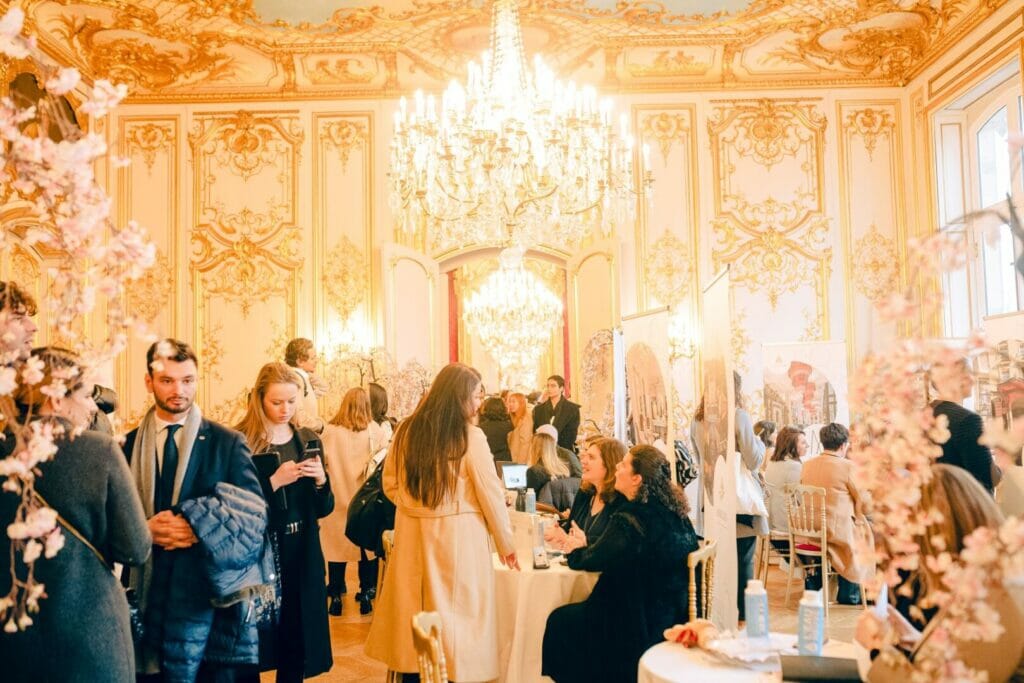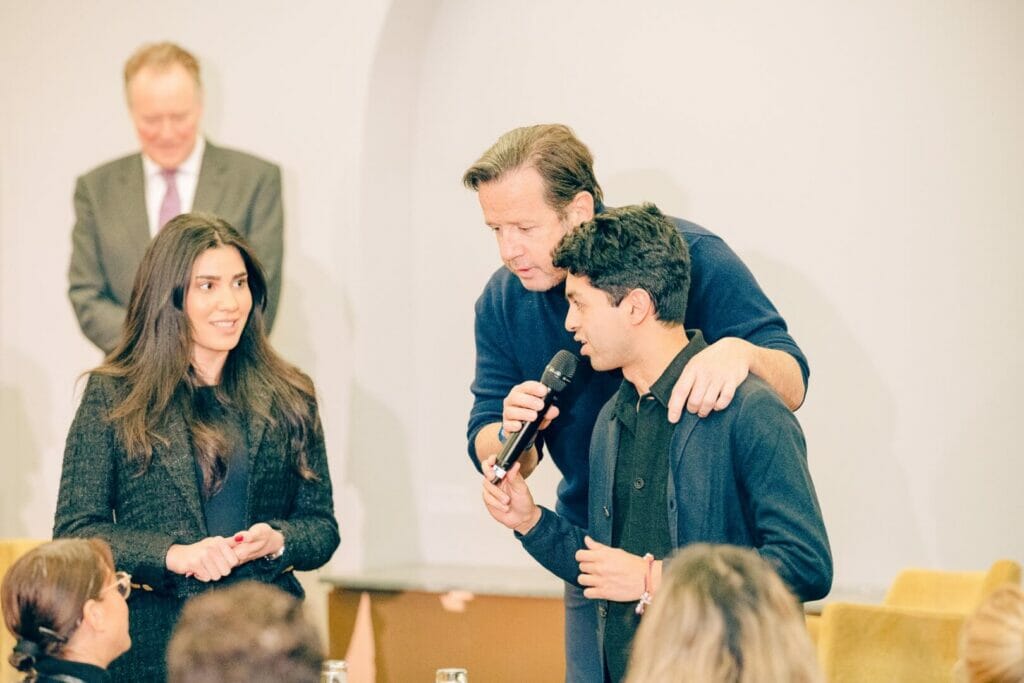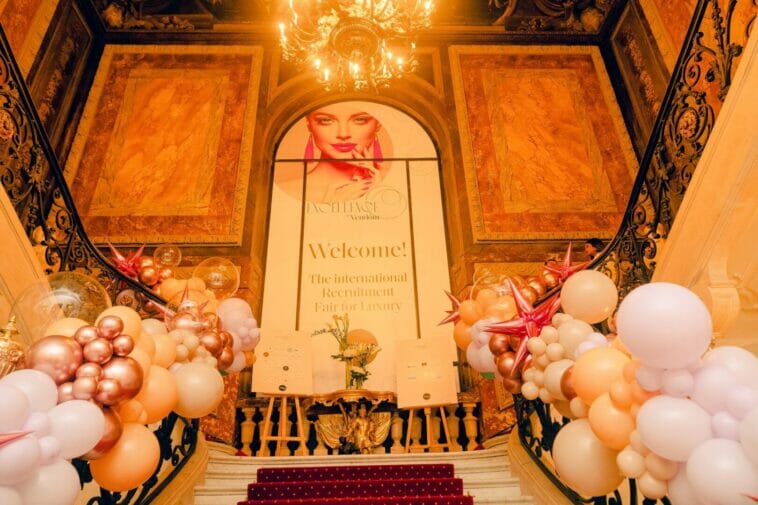Human capital, sustainability, and skills transmission and were among the focus of industry roundtable discussions held at “EXCELLENCE by Vendôm”, a unique event dedicated exclusively to recruitment in the luxury sector.
In partnership with Glion Institute of Higher Education, a business school specialising in hospitality and luxury, The Vendôm Company presented its second edition of the luxury recruitment fair. Held online over three days, and in person at the Hôtel le Marois in Paris on one day, the event brought an immersion into the world of luxury interspersed with conferences, workshops and interviews to bring together luxury actors and future talents.
Recruiters including AccessAir, Accor, Audemars Piguet, Bucherer, Bulgari Hotel London, Cheval Blanc, Chopard, Clarins, Dior, Ferragamo, Four Seasons, Hublot, La Prairie, Louis Vuitton, Mandarin Oriental, Marriott International, Montblanc, Monte-Carlo and Tiffany & Co. showcased their professional environments, and it was an opportunity for candidates to gain visibility with these globally-respected luxury brands.
“It was an incredibly successful edition, with 1,000 talented candidates and 80 luxury brands gathered from all around the world physically in Paris and 4,250 joined online. Interest for luxury and hospitality careers is stronger than ever,” said Vendôm CEO Laetitia Girard.
Other sessions at the event tackled the themes of innovation, corporate culture and customer experience. But it was the programme of roundtable discussions which enabled luxury industry stakeholders to share their thoughts on major issues in the sector and recruitment.
Highlights included:
PEOPLE TO PEOPLE
For François-Henry Bennahmias, CEO Audemars Piguet, luxury brands have tended to overlook the central human element as they have built ever more impressive boutique environments in which to sell their wares.
“With luxury stores, we spend millions and millions on the outside, on the box, then we spend millions on décor, so I said, we need to work on people before we work on the box around the people,” he explained. “And to be successful with people, we had to do it first within the company before we could then do it outside.”
According to Maud Bailly, CEO Sofitel, MGallery and Emblems, the cultural relevancy in the way customers are treated is absolutely key to a global operator like Accor. “One size does not fit all,” she said. “It is hard for us to try to identify the same clients and treat them the same way no matter where we are going to be operating. We are currently in 110 countries, and if you think about the way you treat one guest in one country, if you then try to replicate that treatment somewhere else, you are going to be wrong. This is why we desperately need cultural relevancy, to really make sure we meet each guest’s expectations, locally speaking.”
Therefore, corporate culture and talent recruitment are interlinked with customer experience and customer satisfaction. Conversation further revolved around how the contours of the ‘people’ or HR functions could be redefined as well as the leader’s role in attracting, retaining and developing talent. Employee empowerment is also a key element within corporate culture.
LUXURY TALKS SUSTAINABILITY
“The luxury industry is aspirational; and because of that it must be a leader on this topic (sustainability), to put it on the top of the agenda,” said Manuel Mallen, CEO Maison Courbet, a fast-growing jewellery brand which is pioneering the use of lab grown diamonds and recycled precious metals to make its high-end pieces shared his vision.
Emilie Metge Viargues, CEO Christofle, added: “We are talking about luxury – so at the end of the day, what is luxury? What is a luxury product? Is it something that is unique? Something that can last forever? Is a smartphone that you change every six months or a year sustainable?”
From an economic standpoint, there was an immersive discussion revolving around ethics and sustainability. It is clear that a large number of people now see resale, upcycling or recycling as a viable alternative to fast fashion.


LUXURY AND SKILLS TRANSMISSION
Vastly experienced hotelier Guy Bertaud explained how he ensures new recruits fit the ethos and service standards of Maisons Pariente, the family-owned hotel collection for which he’s Managing Director.
“There are many recruiters who look at CVs, degrees and diplomas, and what you have done in your career; but I say that being yourself is more important than anything else: at the end of the day you must feel comfortable in who you are,” he revealed. “Because that is what guests perceive when they are facing you in our industry. For me that is the essence of our job; it is everything about humanity – we need to be humans talking to humans, and this starts with being comfortable in our own shoes.”
Expanding upon the topic of guest experience and service, Bertaud shared what he has implemented within his company, within operations processes and procedures, and should come after customer relationship management so as for the team to concentrate on those relationships rather than on facility management.
François-Henry Bennahmias, CEO Audemars Piguet, also shared a few examples of unusual profile recruitment that proved successful. Focusing on the right personalities with the appropriate mindset and grit sometimes prevails on the curriculum and the experience.
HISTORY AND MINDSET OF LUXURY
This roundtable explored three of luxury’s most important threads: fine jewellery, haute couture and premium hospitality. The ability to obtain extraordinary items or services is the prevalent notion in the luxury industry as the concept of rarity evolves. Also discussion was how the term luxury is subjective especially given the dynamism of the industry.
Stanislas De Quercize, President and Founder SAVIH, Board Member of Christian Louboutin, associated luxury most closely with storytelling, noting that the best brands and pieces tell a great story. He said: “Storytelling is key. For instance, Van Cleef & Arpels have the four-leaf clover, and that is associated with four wishes: health, wealth, true love and luck. It is vital to be able to express your love, and your values, by a story.”
Véronique Beaumont, COO ESMOD International, expanded upon the notion of keeping a luxury brand relevant. “We talk a lot about storytelling in luxury but it is really about keeping the dream relevant to the story, the values and the culture of the founder,” he explained. “Coming back to this story again and again, but also bringing innovation through the younger creative directors, even if this sometimes takes us down risky paths. Because for sure the founder would have been very innovative himself.”



